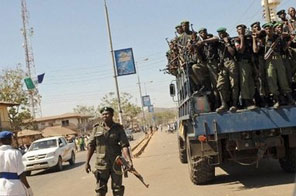Over 200 dead in Nigeria violence
JOS: Soldiers with machine guns patrolled the streets of Jos and charred bodies lay in the streets Wednesday following days of religious violence between Christians and Muslims in central Nigeria that killed more than 200 people.
A nearby mosque still smoldered, its minarets blackened by fires. Authorities have imposed a 24-hour curfew in Jos, but people were seen walking around the center of the city. When an army convoy passed, they stopped and raised their hands above their heads to show they were not a threat.
"We want the government to come and help us," said Abdullahi Ushman, who said he had seen rioters attacking people with firearms and bows and arrows, and had counted five bodies in his neighborhood south of the city.
The rioting began Sunday in this volatile region where religious fighting has left thousands dead over the last decade, although Human Rights Watch said there were conflicting reports about how the latest violence began.
The state police commissioner said it started after Muslim youths set a Christian church ablaze, but Muslim leaders denied that. Other community leaders said the violence began over the rebuilding of a Muslim home destroyed in November 2008 that was located in a predominantly Christian neighborhood.
Witnesses said rioters armed with knives, homemade firearms and stones had attacked passers-by and fought with security forces, leaving bodies in the street and stacked in mosques.
Lt. Gen. Abdulrahman Danbazau refused to speculate on its cause, saying "every side will give its own version."
But he confirmed accounts that some Muslims had been dragged out of their homes and shot by men dressed in what appeared to be army uniforms. He said five of the suspects arrested were dressed in khaki army-style uniforms and claimed to be police officers, though only one of the five men could provide police identification.
Human Rights Watch said Tuesday that more than 200 people had been killed in the latest religious violence, and the group called on Nigeria's government to prosecute those responsible.
"This is not the first outbreak of deadly violence in Jos, but the government has shockingly failed to hold anyone accountable," said Corinne Dufka, senior West Africa researcher at Human Rights Watch. "Enough is enough. Nigeria's leaders need to tackle the vicious cycle of violence bred by this impunity."
More than 13,500 people have died in religious or ethnic clashes across the West African country since the end of military rule in 1999, Human Rights Watch said.
Jos, the capital of Plateau State, has a history of community violence that has made elections difficult to organize. Rioting in September 2001 killed more than 1,000 people and Muslim-Christian battles killed up to 700 people in 2004. Human Rights Watch says 700 died during a similar uprising in 2008.
The city is situated in Nigeria's "middle belt," where dozens of ethnic groups mingle in a band of fertile and hotly contested land separating the Muslim north from the predominantly Christian south. Religious violence in Nigeria normally has its roots in local issues, rather than influence from international extremist groups.
The Minister of Police Affairs, Ibrahim Yakubu Lame, issued a statement Tuesday blaming the violence on "some highly placed individuals in the society who were exploiting the ignorance and poverty of the people to cause mayhem in the name of religion."
Mohammed Larema, a local police spokesman, said that security forces had brought the fighting to a halt Tuesday and that the situation was under control. However, the state government called for additional military units to enter the city.






